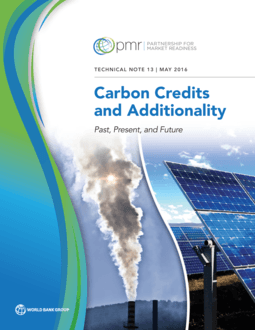Hello! You're looking at a policy document report on Overton
We track government policy, guidelines, think tank research, working papers and more to help our customers see the impact and influence of their work. Are you interested in seeing what information we have to offer? Request a free trial to our platform.
If you fund, produce or manage research or work to influence policy, we'd love to talk. Learn more on our homepage.

Identifiers
doi
handle
10986/24295
Carbon Credits and Additionality : Past, Present, and Future
World Bank Group
Several PMR countries are developing crediting mechanisms for domestic markets. Some countries are developing crediting mechanisms with a view to exploring options for trading with other countries in the future. The concept of “additionality” has long been considered important in the context of these crediting mechanisms as it ensures that the emission reduction or removal that is credited would not have otherwise occurred. However, there are different approaches that have been used and are emerging as new crediting mechanisms are being designed and implemented. This paper clarifies the concept of additionality and its significance for crediting mechanisms; describes the different approaches that have been used to demonstrate or test additionality; and explores the implications of the evolving carbon markets on the application and importance of additionality.
Topics in this document
Carbon offset
Clean Development Mechanism
Emissions trading
Carbon credit
Kyoto Protocol
Climate change mitigation
Carbon emission trading
Carbon tax
Economy
Compact fluorescent lamp
Additionality
Human activities
Greenhouse gas
Efficient energy use
Statistical hypothesis testing
Technology
Policy
Regional Greenhouse Gas Initiative
Profit (economics)
Politics of global warming
Citations
Cited by 8
other policy documents
(3 of them are from other policy sources)
